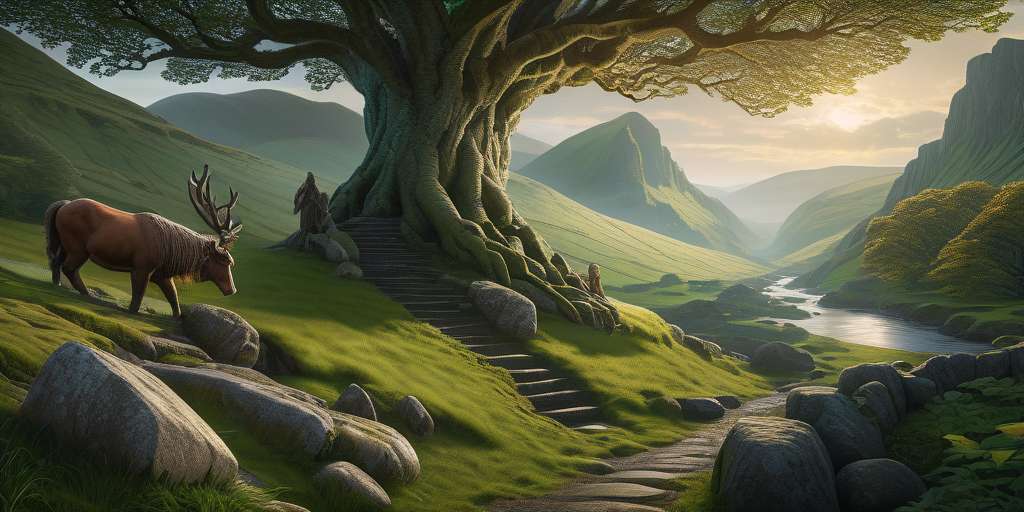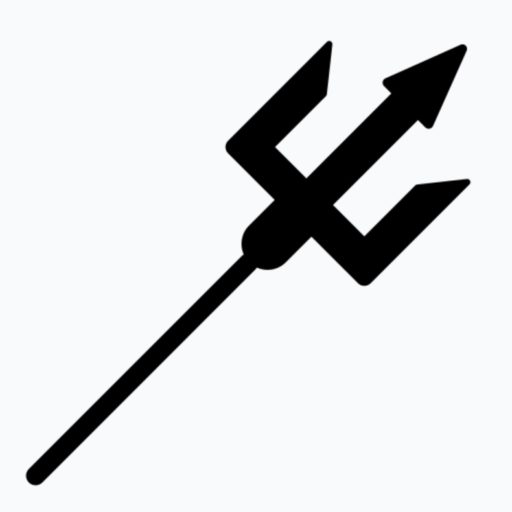Celtic Mythology

Celtic mythology, originating from the ancient Celtic peoples of Europe, takes us into a world of fantasy.
This article explores the major gods and goddesses, highlighting the role of Dagda as the supreme god and Morrigan as the warrior goddess. Celtic myths and legends are also explored, with emphasis on the folk legends of Ireland and the influences of Celtic mythology on other cultures.
In addition, curiosities such as the influence of the Roman conquest and Arthur’s connection to Celtic mythology are discussed.
Gods and goddesses of Celtic Mythology
Celtic mythology is full of gods and goddesses with peculiar attributes and characteristics.
In the following, we will take a tour through the main divine beings of this fascinating tradition.
Tour of the main gods and goddesses
Dagda: Known as the supreme god of the Celts, Dagda is one of the most important deities of this mythology.
Aspects related to fertility, protection and wisdom are attributed to him.
He is represented as a kind and paternal being, with great physical strength.
Morrigan: This goddess is a symbol of war and battle.
She is described as a warrior and protective figure, capable of shapeshifting.
Morrigan is known for her role in prophecy and the fate of warriors in battle.
Other prominent gods and goddesses
- Lugh: Considered the god of light and talent, Lugh is revered for his prowess in the arts and skills essential for survival.
- Dana: This goddess represents fertility and creation in Celtic mythology.
She is attributed with the power of abundance and prosperity. - Epona: Known as the goddess of horses, Epona is worshipped by the Celts as the protector of these animals and related to fertility.
- Cernunnos: This Celtic god is considered the lord of animals and natural forces.
He is represented with deer horns and powers related to fertility and prosperity are attributed to him.
Relationship of the Celtic gods with nature
The gods and goddesses of Celtic mythology have a close connection to nature.
Each is believed to rule and protect specific aspects of the natural environment.
For example, Dagda is associated with crop productivity and Beltane with spring.
This relationship with nature reflects the importance that the ancient Celts gave to their environment and the close connection they established between the divine and the earthly world.
Celtic myths and legends
Legends and folktales from Ireland
Celtic mythology is replete with fascinating legends and folktales passed down through generations in Ireland.
These stories tell of the encounters between gods, heroes and magical creatures that make up the rich Celtic world.
Among the best known legends is the story of Cú Chulainn, the warrior hero who displays unmatched strength on the battlefield.
There is also the story of Deirdre, a beautiful woman whose tragic fate triggers a series of heartbreaking events.
And we cannot forget the death wails of the chilling banshees. These legends not only entertain, but also convey the core values and beliefs of Celtic society.
Cycles and invasions in Irish mythology
Irish mythology is characterized by its cycles and tales of invasions that have marked the history of the country.
The most important cycles are the Ulster Cycle, which narrates the exploits of Cú Chulainn and other heroes of the kingdom of Ulster, and the Fenian Cycle, centered on the legendary warrior group led by Fionn mac Cumhaill.
These cycles reflect the struggles, rivalries and conquests that took place in ancient Ireland.
In addition, invasions by different peoples, such as the Tuatha dé Danann and the Milesians, are also interwoven into the mythological tales, showing how the ancient Irish perceived their history and cultural identity.
Influences of Celtic mythology on other cultures
Celtic mythology has left a deep imprint on other European cultures.
For example, the figure of King Arthur, known for his legendary kingdom of Camelot and the Knights of the Round Table, shows a strong influence of Celtic mythology.
Arthur is considered the embodiment of the Celtic hero, fighting supernatural enemies and upholding the ideals of honor and justice.
In addition, Celtic mythology has influenced medieval literature and the tradition of fairy tales, with elements such as fairies, elves and magical beings remaining present in popular culture to this day.
Curiosities and highlights
In this section we will explore some curiosities and highlights of Celtic mythology, which will allow us to better understand its richness and influence in different fields.
Influence of the Roman conquest on Celtic mythology.
The arrival of the Romans in the Celtic region had a significant impact on their mythology.
As Romanization took place, some Celtic gods and goddesses were equated with Roman deities.
This resulted in a religious symbiosis that fused elements of both pantheons.
Thus, the Celts adopted Roman gods such as Mercury, Apollo, Mars, Jupiter and Minerva, which began to be worshipped in Gaul as well.
This Roman influence on Celtic mythology is reflected in the work of Julius Caesar, who mentioned these gods worshipped in Gaul.
However, the lack of mentions of Celtic names makes it difficult to identify them with the native names used in island mythologies, leading us to reflect on possible discrepancies between continental and island Celtic beliefs.
The figure of Arthur and his connection to mythology
One of the most interesting aspects of Celtic mythology is the connection to the figure of Arthur, the legendary king of Camelot.
Although Arthur is best known through the Arthurian legends, there is a strong influence of Celtic mythology in his story.
Epona, the Celtic goddess of horses
Epona, the Celtic Goddess associated with horses, fertility and nature, left her mark on culture and society. Depicted in various forms, such as riding a horse or feeding foals, Epona is also associated with death according to Celtic mythology. Her influence has...
Dagda, the mighty god of the Irish Celtic mythology
Dagda is a powerful god in Irish Celtic mythology. He is part of the Tuatha Dé Danann, the gods of Ireland. He possesses an imposing figure and is renowned for his wisdom and strength. Dagda participated in battles and had love affairs with other gods. All this, we...
Subscribe
If you want to receive in your mailbox stories, curiosities and legends of the most fascinating creatures of classical mythology just fill in this form.

Classical Mythology
mitologiaclasica.com is a website dedicated to explore and spread the fascinating richness of mythology, offering a vast compendium of stories, characters and legends.
Madrid, 2023
info@mitologiaclasica.com
Explore
Greek Mythology
Roman Mythology
Norse Mythology
Egyptian Mythology
Hindu Mythology
Chinese Mythology
Japanese Mythology
Celtic Mythology
Privacy Policy
Privacy Policy
Copyright mitologiaclasica.com

